Not all types of RV camping are created equally. Deciding what option is right for us has involved a lot of trial and error. There are SO MANY options – from boondocking alone in the woods to RV parks with all the amenities, and some unforgettably strange places in between. Sometimes it is a struggle to manage our RV camping budget with personal comfort, but it is possible!
Now that we’ve tried out every type of RV camping out there, we’ve put together our top considerations for each and what we think works best.
Free RV Camping
It is hard to argue with free. But when RVing, there is a trade-off for dry camping in parking lots or public lands. Depending on weather, it may be necessary to run the generator (for a/c) or propane (for heat) for extended periods of time – which is an important, although minimal cost to consider.
Parking Lot Hopping
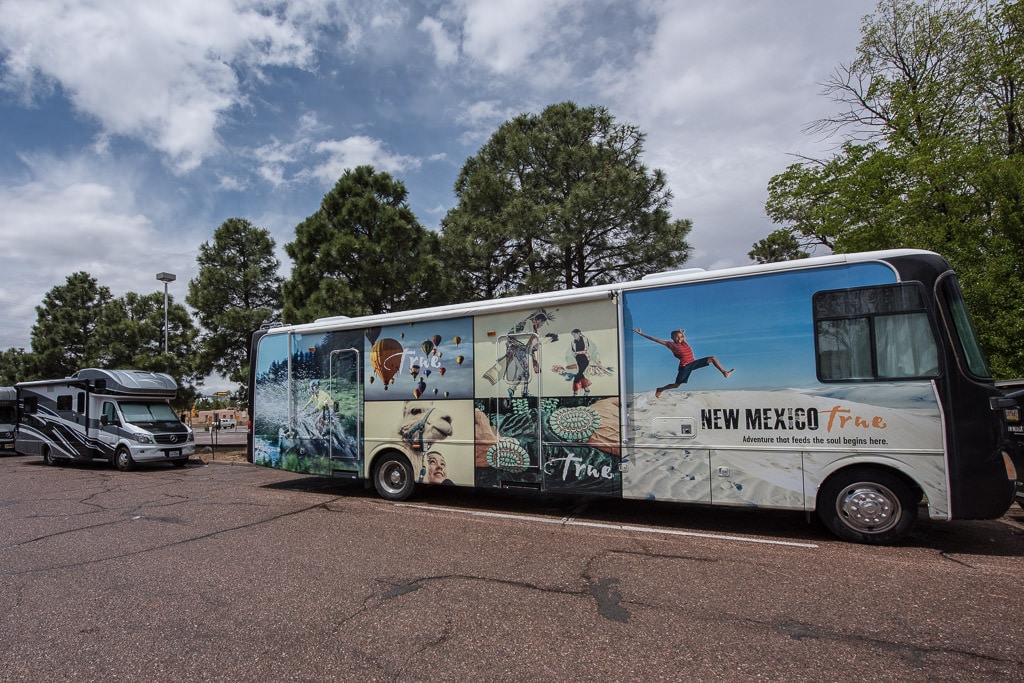
It is no secret that RVers often crash in Walmart parking lots on their way to a new destination, or as a way to save on camping. Cabella’s, Cracker Barrel & rest areas are other common free parking lot options. We even found out that the Visitor Center in Santa Fe, New Mexico, allowed overnight parking.
- Pros: At no cost, this is definitely a budget-friendly option. Plus, we do enjoy being close to a store with many essentials.
- Cons: The biggest downfall with this option is comfort. Walmart especially can be noisy and have questionable characters hanging out. We are also usually bored and restless in parking lots, since they don’t often have nearby trails or activities other than shopping (not our favorite).
For us, this is a backup option if we can’t find any other inexpensive options nearby. And if we do end up crashing at a Walmart, we’ve learned that it is important to get there as late in the afternoon as possible – especially if it is hot, to avoid running our generator in the heat of the day.
Boondocking
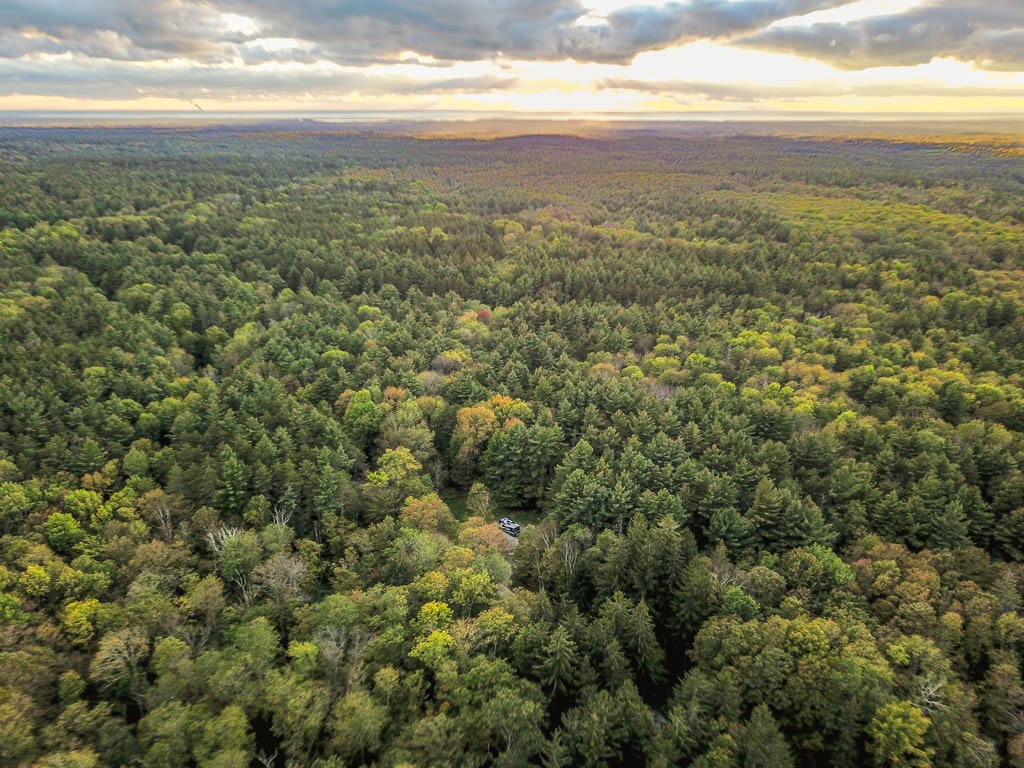
To us, boondocking is usually associated with Bureau of Land Management, National Forest or other public lands that allow camping. We have a love-hate relationship with this type of dry camping. We’ve ended up in some gorgeous places, but it can be really creepy also – especially with no cell service!
- Pros: In addition to costing $0, many spots also have awesome trails, or at the very least, some epic views or peaceful solitude. This really gives us that camping, “getting away from it all” feeling we crave. And it has led to our BEST stories!
- Cons: The silence can definitely get spooky if we let our imagination run away from us. And if we don’t have cell service, it makes the thought of emergencies a lot more daunting. It also makes it impossible to get much work done if we don’t have internet. But the biggest consideration is fuel costs. Depending on how far the camping spot is, we can easily spend $50 in gas driving into the middle-of-nowhere to find it. So, looking at the cost-benefit ratio for this type of camping is key. We also have to plan for generator, propane and water usage – especially for longer boondocking trips.
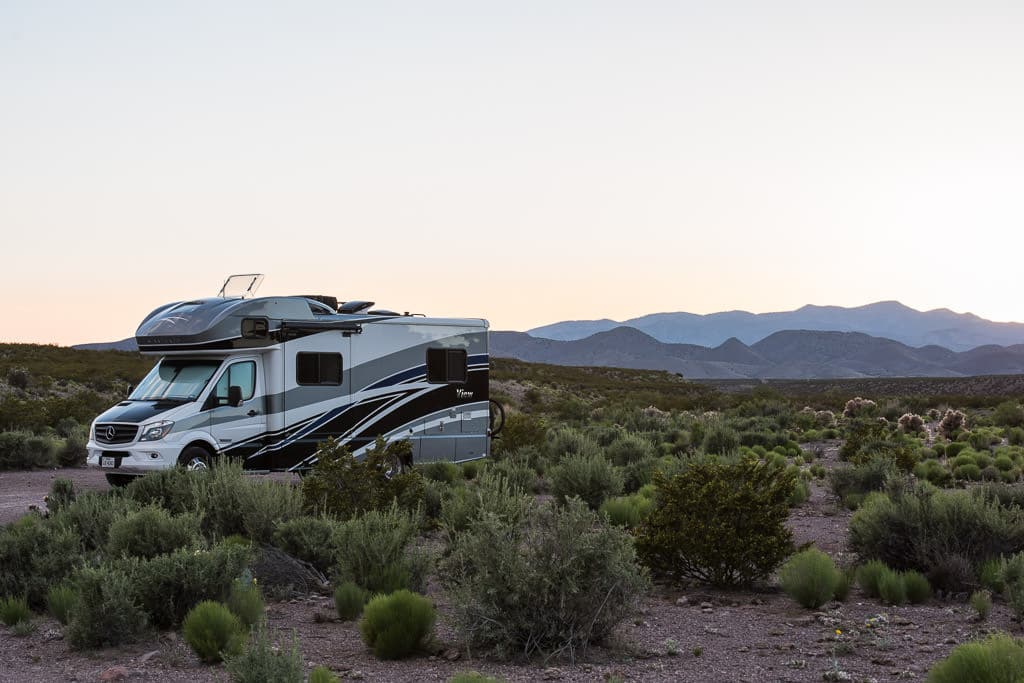
Overall, this is our favorite way to camp when we aren’t working on big projects. Although, we have learned to make sure we do our research to try to find out if the site will be level, have signal and offer hiking options. Sites like freecampsites.net and campendium.com are great for getting tips for boondocking spots.
We also make sure we aren’t going so out of the way that it ends up costing more than a campsite with hookups would. We spend about $0.20 per mile on fuel. So, if we drive around for hours looking for a cool spot, we are no longer saving money. Having a back-up plan is usually key too, in case the spot we had in mind is taken or a dud. But, that’s why we like boondocking – it is quite the adventure!
Moochdocking
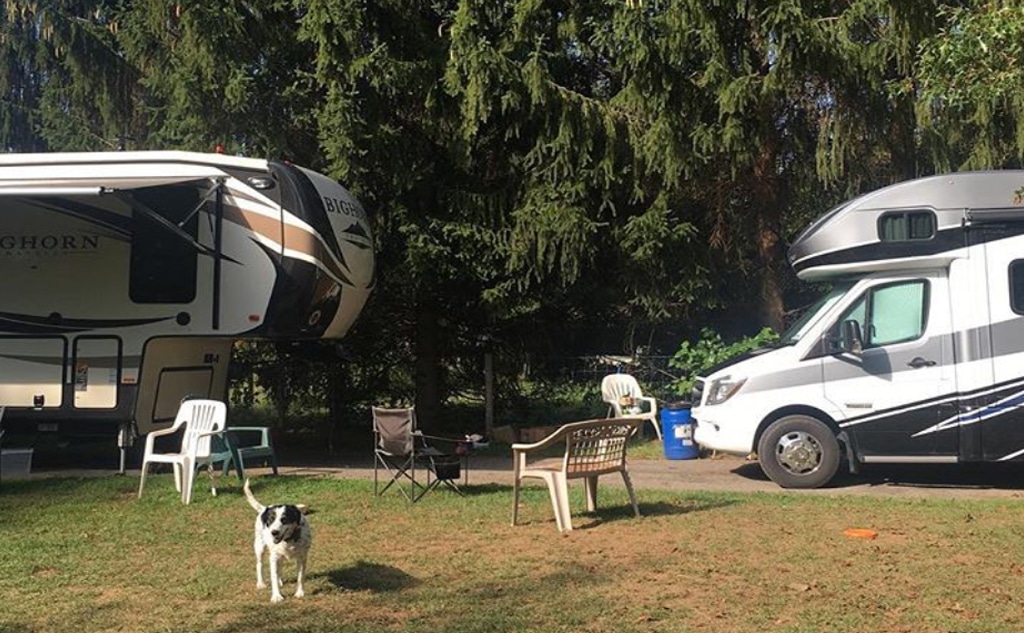 Photo thanks to Rob & Kelley, @WanderingWimps on Instagram.
Photo thanks to Rob & Kelley, @WanderingWimps on Instagram.
This is a fun and unique option for people that happen to have family or friends with an open driveway, yard or other land they can let an RV park on. Bonus points if they’ll let you plug in!
- Pros: In addition to being free, this makes it easy to hang out with family and friends! Plus, we are often asked if we want to use a “real” shower, do laundry or plug into the house electric.
- Cons: Worrying about over-staying your welcome, possibly having to run the generator or propane, and many driveways are unlevel.
We got to experience the benefits of this when we stayed with our RVer friends Kelley & Rob who were actually moochdocking at a family member’s house. It was so much fun to be parked next to friends and get to hang out while still having everything we needed a few steps away.
This is something we’d definitely do again and have had some family already offer. However, it seems like asking about using electric, how level the area is, and if the neighborhood allows overnight parking are important questions before accepting an invitation. Not everyone has wide-open yards perfect for parking RVs!
Low-Cost, Unique RV Memberships
At less than $50 per year, we decided to give both of these popular options a try and would suggest new RVers do the same. Everyone travels differently, so it is fun to find out about all the unexpected options out there. And these will certainly give you plenty of fun tales for the campfire.
Harvest Hosts
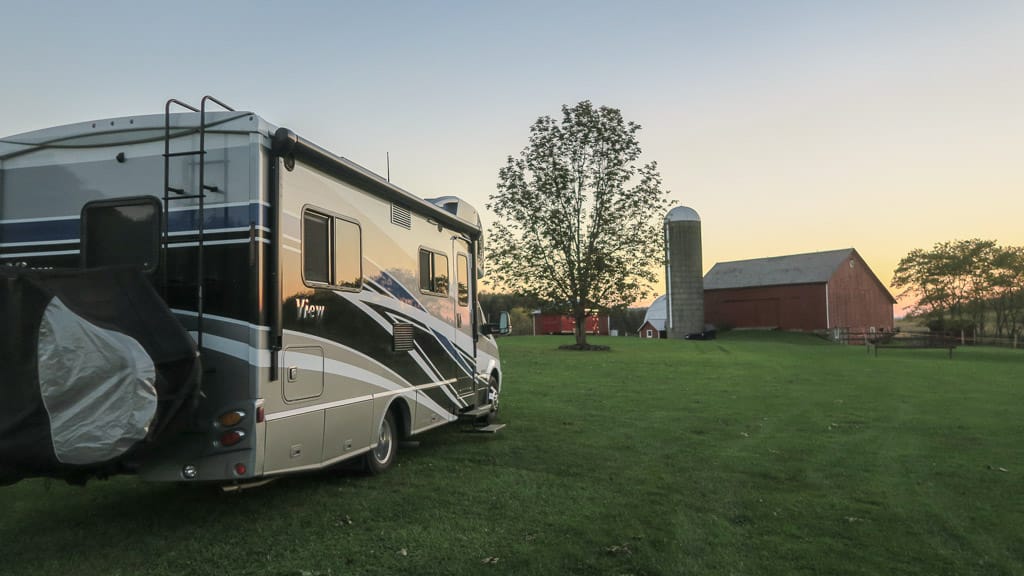
We loveeeee this unique membership and use it all the time. It gives us access to a list of farms, wineries, museums and other businesses that allow RVers to park overnight. At only $44 per year, it is very affordable and provides us with a ton of value. We just call up a host at least 24 hours before our planned arrival and make sure they have room for us – so easy!
- Pros: We get to meet some truly amazing people and have really cool experiences through this membership. And since we don’t have to pay to park overnight, we can spend money on wine or food instead while supporting a local, passionate business. The views are often stunning as well! (Read about more benefits in this article we wrote for WinnebagoLife).
- Cons: It is easy to go over your budget if you aren’t careful – especially at wineries. We have also learned to ask how level the parking area is because some are very uneven. Although a few hosts have allowed us to use electric, propane and generator usage is also a consideration.
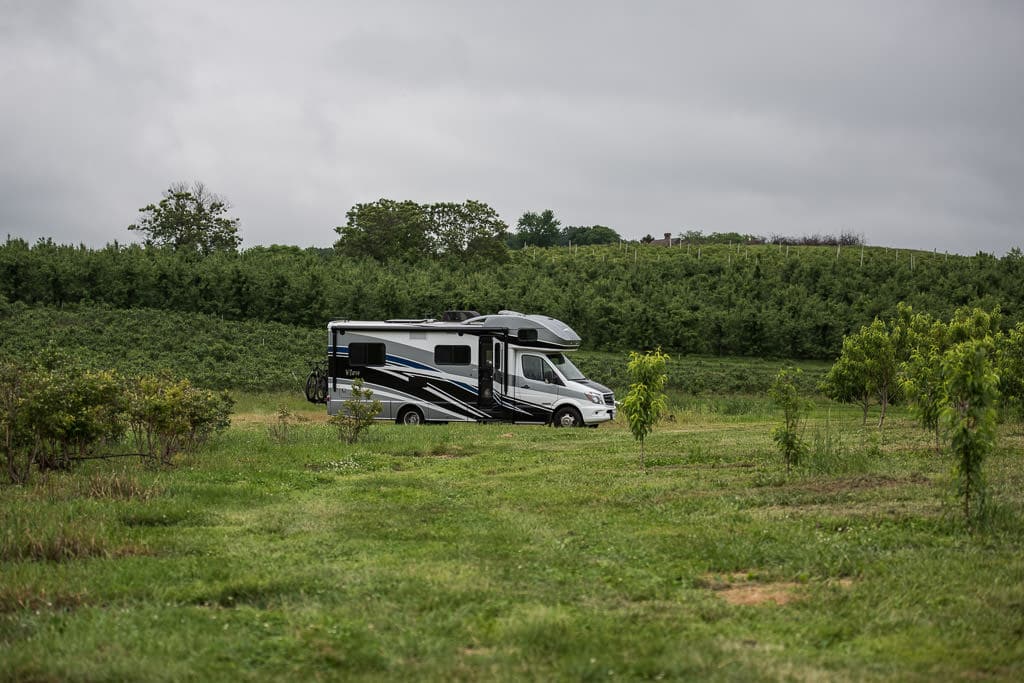
This is a go-to for us and we use it whenever possible. And with more than 500 participating businesses, we can usually find one nearby. However, we have put a $30 max cap on our spending, so we don’t spend more than it would cost to go to a cheap RV park. We also try to only buy things we would usually get, which means staying at farms as often as possible. Although, we’ll rarely pass up an awesome vineyard experience – they are just so pretty at sunset!
Boondocker’s Welcome
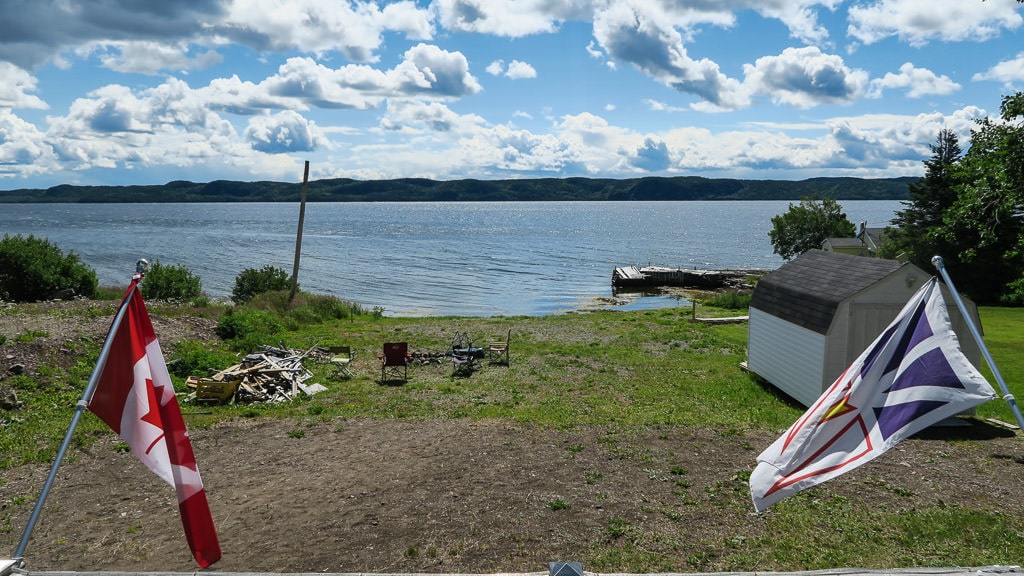
This is a very unique membership program for RVers because it is a list of other RVers who will let you stay on their personal property. It is very similar to moochdocking, except you have to pay the annual membership fee of $24.95 to access the contact information of participants. And you are crashing on a stranger’s property.
- Pros: You get to meet interesting people while saving money and may even make friends for life.
- Cons: This one is a bit harder to set up because you have to go back and forth on the sites messaging system. It can also feel really awkward and uncomfortable until you get to know your host.
We used this one time while in Newfoundland and had an amazing visit. Our hosts were wonderful and even invited us to the husband’s birthday party the next day – which was a blast and led to us falling absolutely in love with the local Newfie culture!
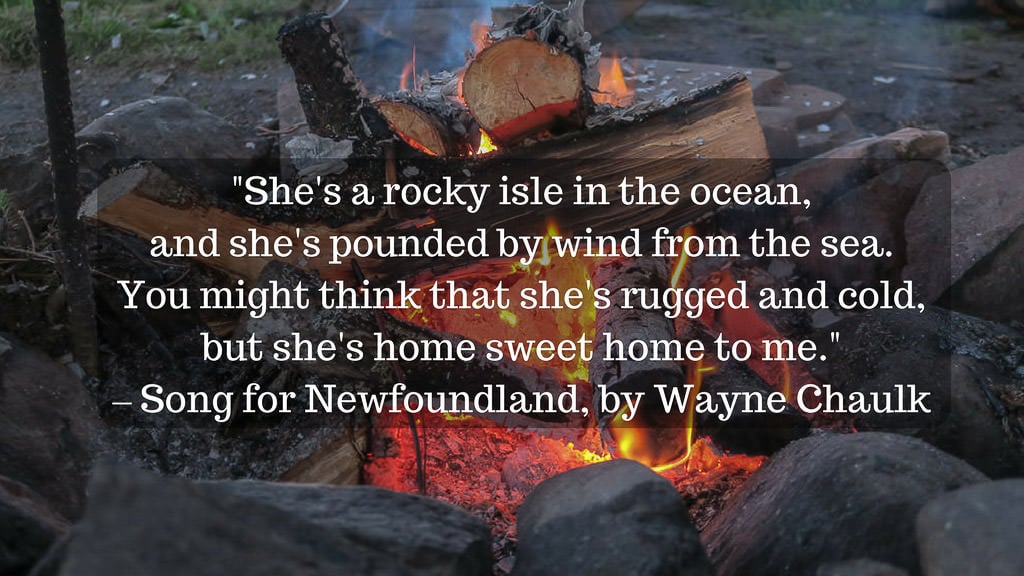
Although this was a highlight of our trip, we won’t likely use this membership again because of how awkward it was to set up. And when we got there, we weren’t sure if we were expected to hide out in our RV or hang out with the home owners (until they welcomed us like family, of course). However, it is a really special option that we’d recommend others at least try. Just make sure to bring a gift for your hosts!
Government-Run RV Campgrounds
From city parks to national parks, these options are often some of the most scenic and provide lots of options for well-maintained trails. Depending on the popularity of the area, prices vary significantly. However, many we have found are very affordable and often offer great views and recreation options.
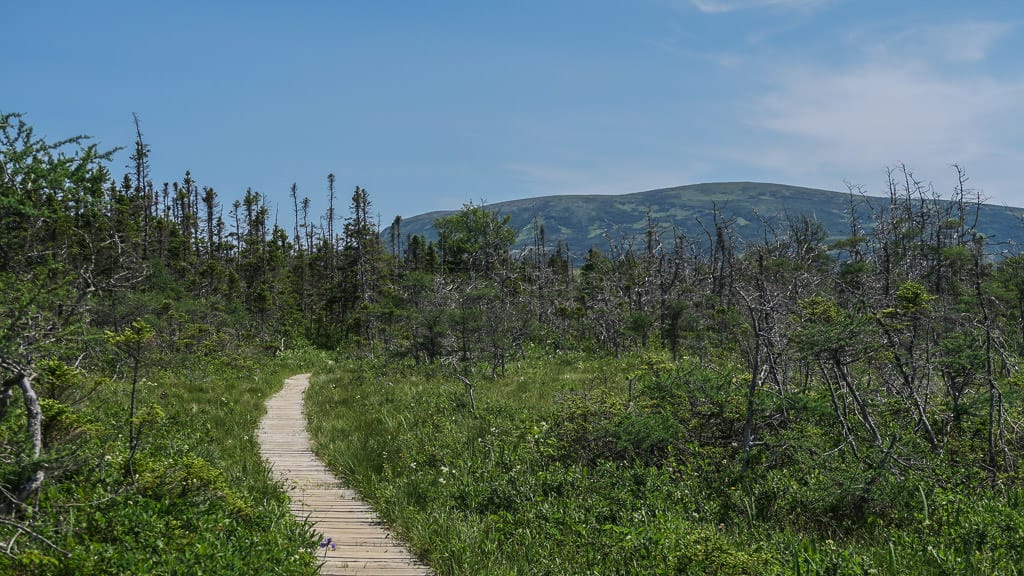
There really aren’t many significant negatives to these, they are just hit or miss depending on the location and time of year. A little research goes a long way when planning to stay at one of these options. Make sure to ask what the max RV length is for sites, if hookups are available, and if there are any rules or additional fees you should know about.
City RV Parks
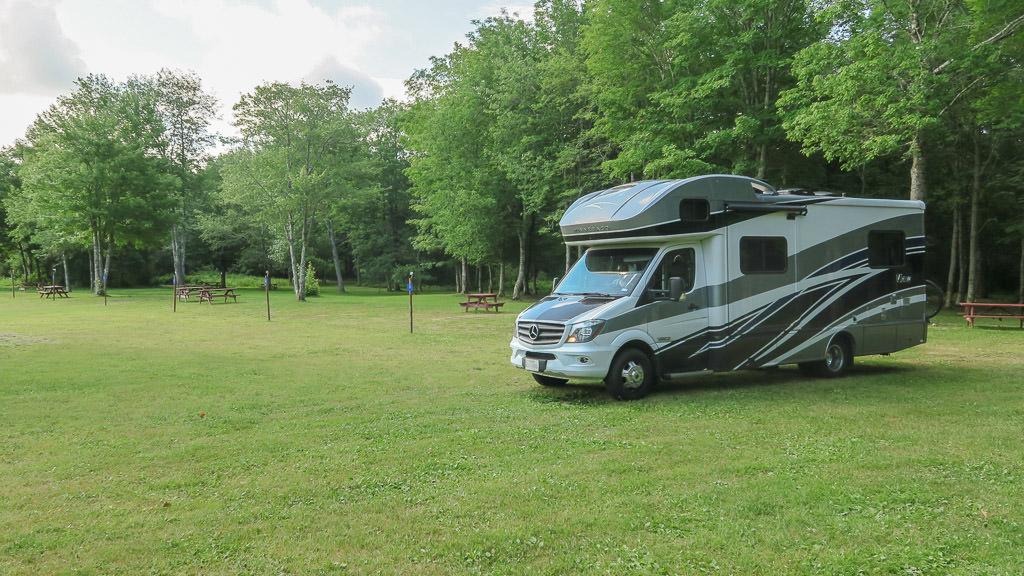
Our experiences withe these are kind of all over the place. Sometimes we stumble upon a beautiful, well-kept park and other times it is very sketchy and looks like a hangout for the neighborhood hooligans. However, these are pretty consistently inexpensive. We’ve found a few for $10-15 with hookups. Just do your research, read reviews and look at Google Maps before showing up.
Military RV Parks
Since neither of us have ever been in the military, this is the only option we haven’t personally tried. But, we have friends that rave about it and say it is a great budget option.
U.S. Army Corps of Engineers RV Parks
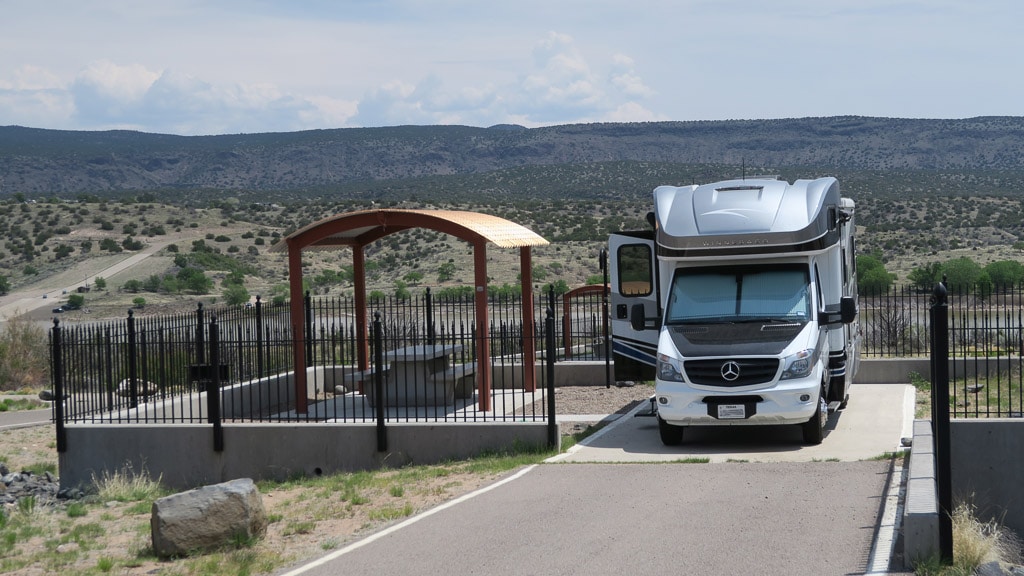
These parks are focused around water recreation and often have great hiking, boating and fishing options in addition to camping. In our experience, they are also very affordable, well-kept and in scenic areas.
State Parks & Forests RV Campgrounds
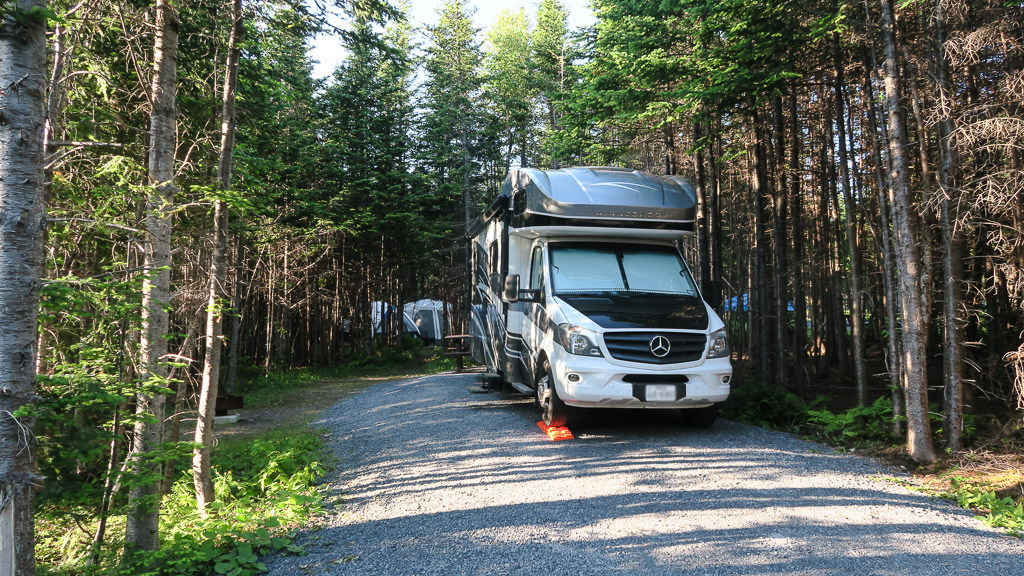
We really love staying at state parks because of all the recreation options. However, prices for these are all over the place depending on what state you are in. Some states (like Texas) charged us an entry fee and a camping fee.
While other states have free entry to their parks, which makes camping way less expensive. This is definitely something to clarify. Also, check if there are any awesome deals for longer stays or visiting in the off-season.
RV Campgrounds in National Parks, Monuments & Forests
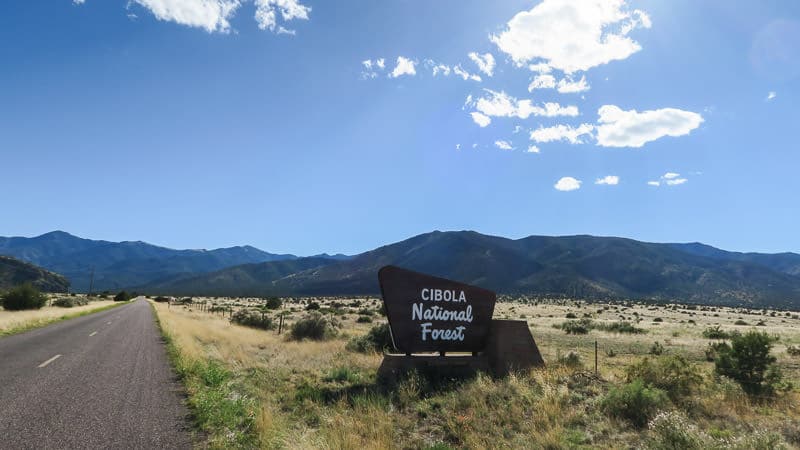
Staying at these campgrounds puts you close to many of the top local attractions. There are often shuttles that will pick up from the campground for free and take you to a trailhead or visitor center. However, the rules at these are often more strict than usual and they may limit RV size.
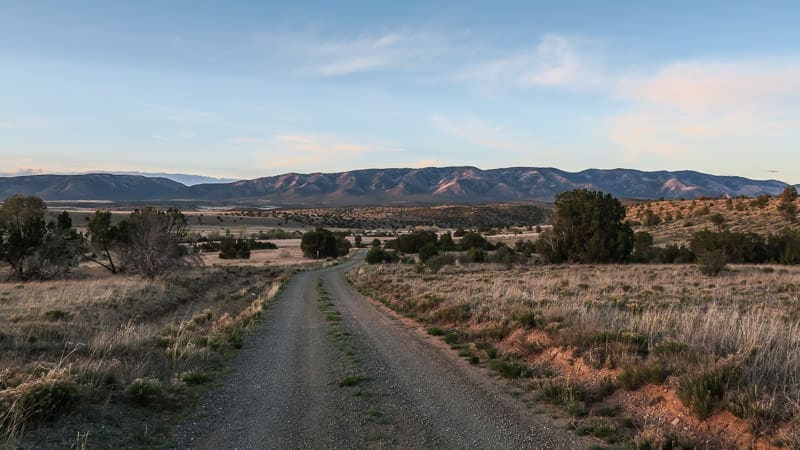
Getting to them may also be a hassle, since some are in mountainous areas with steep or dirt roads. Again, research is key before deciding on any campground. Also keep in mind that National Parks can book up very far in advance for popular destinations and seasons, so it may not be a great last-minute option.
Privately Owned RV Parks & RV Resorts
Usually, the longer you stay, the less expensive the daily cost is at an RV park. A park may be $30 per night, $200 per week, but only $350 a month. This is why we’ve started to stay at parks longer whenever possible. There are also many discount programs that can help with sticking to a budget!
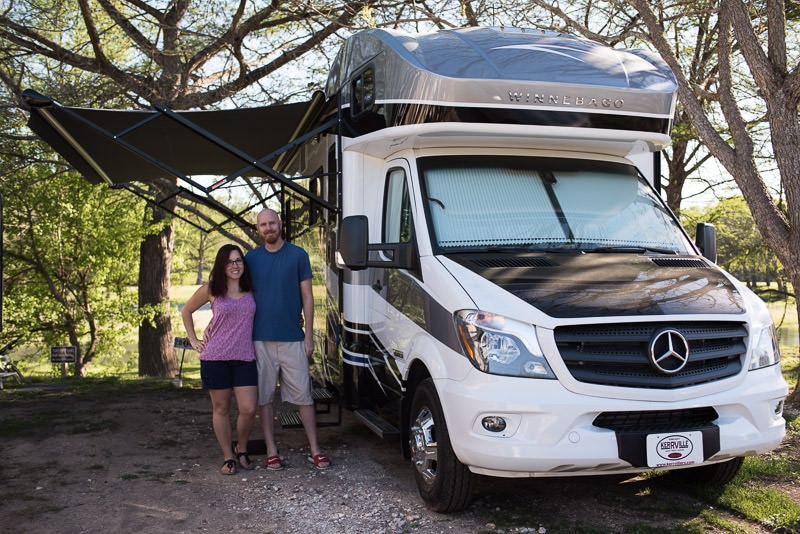
RV parks vary tremendously. Some are extremely expensive for what seems like no apparent reason (no added amenities, not in a prime location). But, occasionally we’ll stumble upon a very well-priced RV park next to a popular destination with free Wifi, a pool, and weekly events for visitors.
We have found that non-profit, individual or family-owned RV parks are often much less expensive and are more willing to work out a deal on weekdays and off-season. Chain parks like KOA and Jellystone usually have better amenities, like a large rec room with games, tennis courts, etc. However, this isn’t a hard rule. Some KOAs are just expensive for the sake of being expensive it seems.
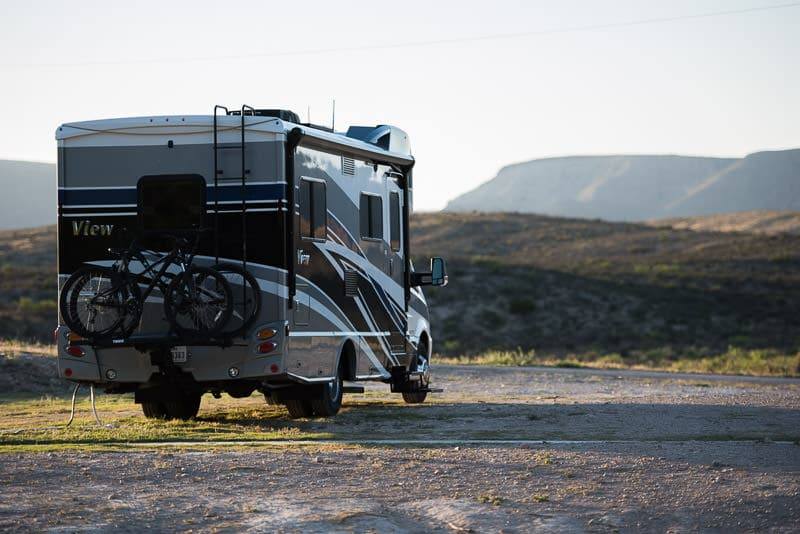
Before booking any RV park, we usually check multiple sources for reviews and information. The RV Parky app and Campendium.com are our go-to options, but Google reviews can be valuable as well. We also try to find as many photos as we can, check what there is to do nearby, and call to see if there are any issues we should know about (unlevel sites, etc.)
Discount RV Camping Programs
Most people that stay at RV parks regularly are signed up for one of the many discount programs available. Some of the most popular are Good Sam, Escapees, Passport America, and Thousand Trails. Many parks also give military and AAA discounts.
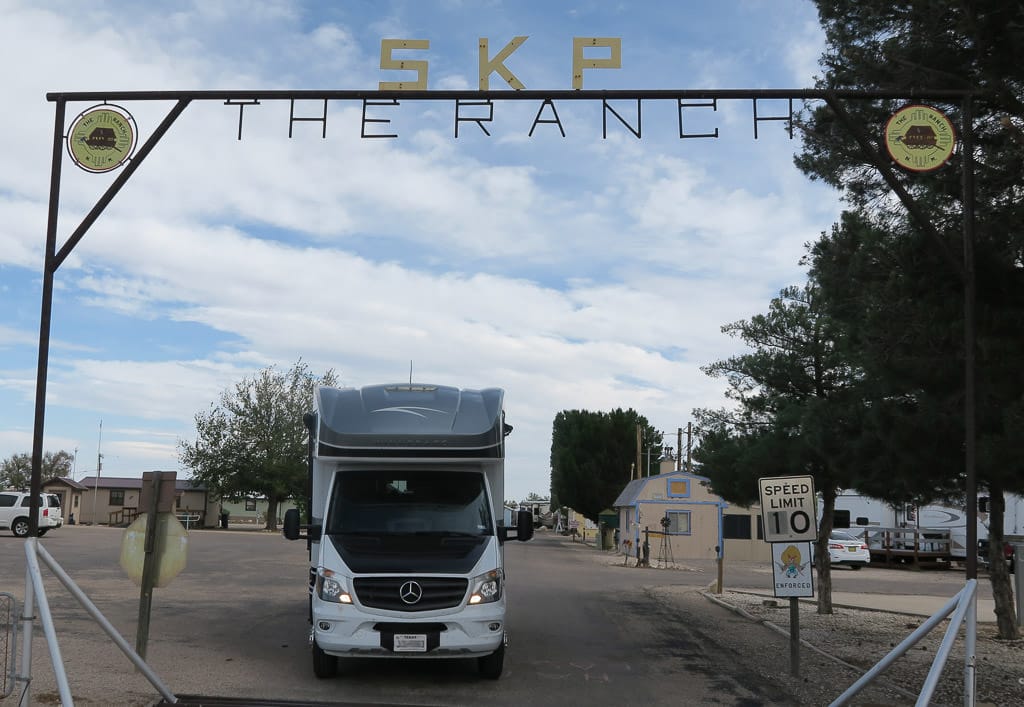
Since we have an Escapees membership for their mail forwarding service, we use that all the time for discounts. Our favorite is the Escapees Co-ops which offer extremely discounted rates for first-time guests. Most recently, we booked a park for $100 per week! Now that we are planning more time at RV parks, we will begin using Passport America as well.
The Good Sam discount is usually the same as our AAA discount. So, we see no reason to join a second program. And Thousand Trails is a much more expensive option to sign up for. Although, we’ve been told by other RVers that the price is made up for in savings.
Just Right RV Camping …
So, which is the best option? For us, it is a mix! If possible, we’ll stay at a state park, national park or campground with lots of outdoor activities for a few weeks at a time. This allows us to get outside for most of the day, while still being productive with freelance and blog projects. (Moving daily is a huge hindrance to productivity!)
However, it really comes down to price. We’ll usually go with the best deal that is reasonably close to scenic areas and has good online reviews. It is also key to ask about internet and cell signal before booking, so we can get work done.
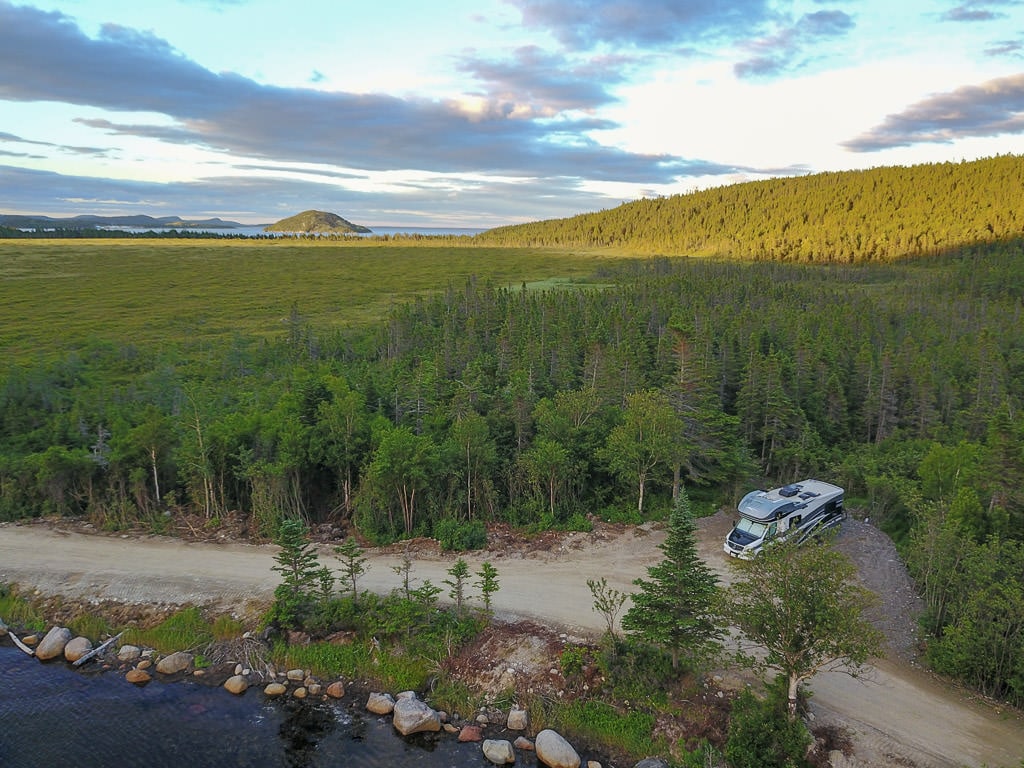
But we really love to go on boondocking adventures and use our Harvest Hosts pass. So, we make a point to have a week or so between longer campground stays in order to pop around to these options. We see this as our “vacation time.”
We try to make sure we are ahead on projects and have our posts scheduled during this time, in case we don’t have internet. And, of course, the Walmart parking lots are good as a boondocking back-up plan or when we need an easy place to stop while en route.
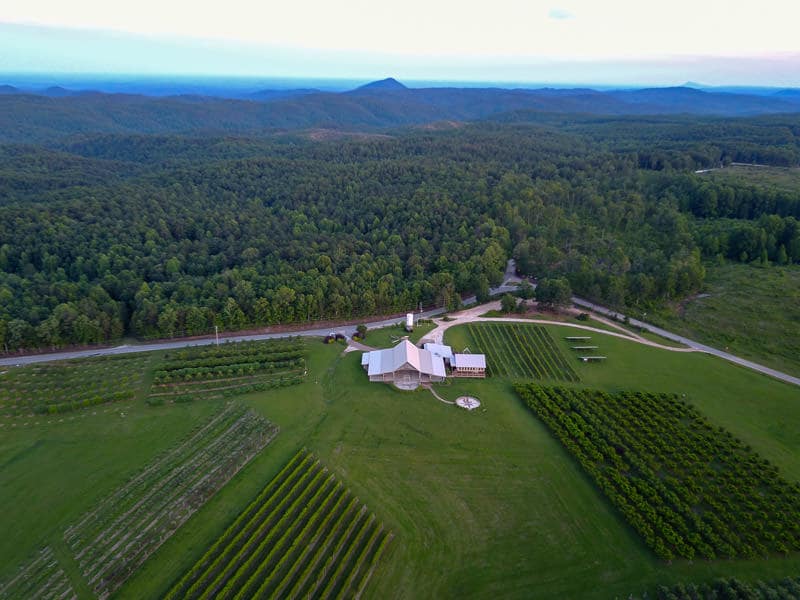
After months of trying different combinations, we are loving this new mix we’ve decided on. We still have our adventures, but aren’t constantly stressing about when we will have internet again. Also, with some especially low weekly or monthly rates – we can actually save some money by not driving around as much!
Want to read about EVERYWHERE we’ve parked so far? Check out our RV Camping Reviews page! And check out our RV gear & resources page for product tips.

Great thorough article, thank you.